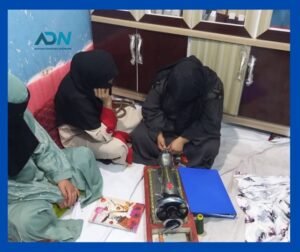Unearthing Afghanistan’s Hidden Wealth: A Looming Crisis in Mining

The figure in the middle-right is the Minister of Mining and Petroleum for the Taliban, accompanied by unidentified individuals in the pictures. The image was obtained from the ministry's X.
By Ilhamuddin Afghan
In the wake of the Taliban’s resurgence in Afghanistan, the country’s mineral-rich lands have become a focal point for foreign and domestic companies seeking extraction and processing agreements. The Taliban leadership has inked contracts for seven substantial mines, including gold, iron ore, zinc, among others, with companies hailing from Afghanistan, Türkiye, Iran, and the United Kingdom. These agreements promise investments of around six billion dollars, drawing attention to the potential economic significance of Afghanistan’s vast natural resources.
However, beneath the surface lies a complex web of concerns. Afghan mining experts are apprehensive about the lack of professionalism in the execution of these agreements, which could result in irreparable damage to the nation’s natural resources. While Taliban officials maintain that these contracts involve cooperation between foreign and Afghan companies, mining experts argue that these agreements often sidestep international principles and transparency.
According to Bakhtullah Nouri, a mining affairs expert, it is local Afghan and regional companies that stand at the forefront of these contracts, with English firms facilitating the documentation process. This arrangement, he claims, occurs as a result of compromises rather than adherence to international best practices. Furthermore, Mr. Nouri expresses serious concerns about the illegal extraction of resources, which, if left unchecked, could lead to substantial future harm.
The immense value of Afghanistan’s mineral resources cannot be overstated. The region boasts vast reserves of valuable minerals, including lithium, which are estimated to be worth trillions of dollars, according to some American geological surveys. While agriculture is considered key to Afghanistan’s stability, mining and petroleum hold the potential to significantly enhance the nation’s prosperity. For this to happen, it is crucial for the allocation of mining contracts to adhere to transparent procurement processes and established laws, ensuring that the wealth generated benefits the entire Afghan population.
Abuse of Afghan Resources
Unfortunately, the prevailing sentiment is that mining has not served as a pathway to prosperity for Afghanistan but rather as a conduit for the interests of a select few, fostering corruption and impropriety.
Anonymous testimonies from within the industry paint a bleak picture. Some have reported acquiring mining contracts without proper evaluation or due process, highlighting how a privileged class appears to operate with impunity and little concern for accountability.
An anonymous manager of a company reveals that he acquired a mining contract in a specific region of Afghanistan. “The Taliban Minister for the Ministry of Mines and Petroleum freely awards contracts to favored companies, securing his own interests with apparent impunity. Unconcerned about potential inquiries and unafraid of repercussions,” the manager stated.
As Muhammad Akram, a former civil activist, suggests, the focus of mining endeavors has primarily been on maximizing revenue for the Taliban rather than ensuring the long-term sustainable management of mineral resources. The rampant corruption and mismanagement within the mining sector serve as a breeding ground for extortion, with the Taliban and their supporters benefiting at the expense of the nation’s wealth. Unprofessional mining practices pose yet another significant challenge, as the extraction processes often rely on outdated machinery and non-technical personnel.
Corruption Threatens Resources
Of even greater concern is the use of explosives to extract precious stones, a method prohibited under previous laws implemented by the government of Ashraf Ghani. This practice continues unchecked, causing further damage to the country’s resources. The Ministry of Mines and Petroleum is marred by allegations of corruption, with unqualified individuals occupying key positions, thereby jeopardizing the future of Afghanistan’s mining sector.
Amidst this landscape of corruption and unprofessionalism, educated and conscientious individuals find themselves hesitant to speak out against the ongoing exploitation of the nation’s mineral wealth. The oppressive rule of the Taliban has instilled fear, preventing many from raising their voices in opposition to the plundering of the country’s resources. As the Afghan population grapples with poverty, the stealing of national wealth persists, and those who could make a difference remain silent.
Afghanistan’s mining industry stands at a critical juncture, with a desperate need for transparency, professionalism, and accountability in the management of its valuable resources. The path to prosperity and stability can only be realized if the nation’s wealth is harnessed for the greater good of all Afghans rather than serving as a conduit for a select few with vested interests. Failure to address the rampant corruption and negligence in the mining sector could have lasting repercussions for Afghanistan’s future.
Ilhamuddin Afghan is a university professor based in Afghanistan.
Note: The contents of the article are of sole responsibility of the author. The Afghan Diaspora Network will not be responsible for any inaccurate or incorrect statements in the articles.






